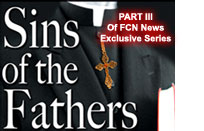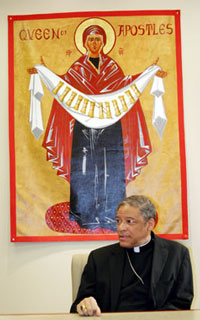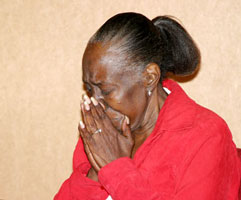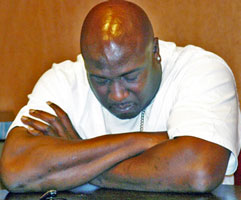Seeking Justice: A Crisis in the Catholic Church
By Ashahed M. Muhammad -Asst. Editor- | Last updated: Mar 16, 2010 - 1:26:09 PMWhat's your opinion on this article?

|
CHICAGO (FinalCall.com) - The Roman Catholic Church in America has been reeling for the past decade with shocking instances of sexual abuse at the hands of members of its sacred and secretive clergy.
The most recent embarrassment for the Catholic Church reached right into The Vatican. Angelo Balducci, a Gentleman of His Holiness—an exclusive group of servants inside the Pope's household—was caught by law enforcement officials via wiretap allegedly arranging trysts with male prostitutes.

Bishop Joseph Perry, vice-president of the Board for the National Black Catholic Congress. Photos: Timothy 6X
|
Multi-million dollar settlements in response to sex scandals are reported with regularity, almost daily in the media, and stretch across the Atlantic Ocean to Ireland and Rome. However, you don't have to go that far to hear sordid tales of abuse and misconduct, nor do you have to travel far to see the twisted emotional wreckage that exists in the lives of many of the victims.
Reginald Montgomery, now 40, met Father Victor Stewart when he was just 13-years-old. Reginald enjoyed playing basketball and wanted to play on the team. Like many of the young boys in the neighborhood, they looked up to Fr. Stewart as a father figure, a mentor. A good player, Reginald made the team and would from time to time share with Fr. Stewart, a trusted guide, some of the problems he had with his mother.
Then, the abuse began.
“He would always see me hanging around the rectory with the guys that lived there. I would get hungry and he would say ‘come on in you can sleep up here tonight.' He had this one room and he would take you in there and the only way you could get out of this room is if you had a key. I would sit there and I would fall asleep and then I felt somebody come rubbing on me,” said Mr. Montgomery. “He just did what he wanted. I tried to get him off me but he was stronger than me; he actually raped me. I was too embarrassed and ashamed to show my face because some of the guys that lived there saw him come downstairs to get me,” Reginald continued. “He used us because we didn't have anything. The one's that he knew needed shoes, needed clothes, needed food, he had that hanging over your head always.”

Eloise Owens
|
Eloise Owens, Reginald's godmother, shed tears while being interviewed by The Final Call. She still feels angry and guilty because she saw the signs, and instinctively knew something was wrong, but failed to act.
“I started noticing the things the kids were doing that they never did before. He (Reginald) has quite a temper, but I could always walk up to him and say ‘excuse me, Reggie sit down.' But he was fighting his best friends,” said Ms. Owens who did not realize at the time that Fr. Stewart was employing the age old divide and conquer strategy to maintain control and influence over all of the young boys at the rectory.
He never forgave Fr. Stewart and never forgot what he had done to him. With vengeance on his mind, hate simmering in his heart and two loaded handguns, Reginald stalked Fr. Stewart for a year, waiting for the opportunity to kill him.
“I had made up in my mind I had wanted (to kill) him so bad I could feel it,” said Reginald describing driving around Chicago with the locked and loaded guns sitting on the back seat of his car looking for the time to strike. One evening, while driving by and looking at the door of the place where Fr. Stewart lived, he was pulled over and arrested by members of the Chicago Police Department on gun charges.

Reginald Montgomery
|
Fr. Stewart died of an unspecified illness in June of 1994.
As a result of what Mr. Montgomery has gone through, he can barely sleep uninterrupted. Each time the lights go out, he has flashbacks. He walks the streets with a simmering rage, ready to fight at any moment.
“I have to sit there and literally drink myself to sleep,” said Reginald, recounting one terrible incident involving his wife. “I'm sitting in the room by myself and she walked up behind me and touched me. I lost it. Because I didn't hear her come. I think I hit my wife twice and almost killed her. I blacked out. Because that's what he (Fr. Stewart) would do. Right now today, I still don't like people walking behind me. I didn't use to be like this. I was just outgoing. I never was violent until this. Now it's like I stay away from people so I don't get into altercations with them, because I'd probably end up killing them. I take my frustrations out on everybody. I don't care who it is, I'm just … I need help and I know I need help,” said Reginald, breaking down in tears.
For the first time in almost 30 years, he recently went back to church.
Diane Bell, a victim of the late predatory priest Terence Fitzmaurice said she was abused between the ages of 9 and 13 and feels like justice escaped her, because he died before having to face many of those he abused.
“He turned my life upside down,” said Ms. Bell. “I feel like I got raped all over again once I found out he died,” she added.
No help for victims
It's not hard to see why Black victims of sexual abuse at the hands of Catholic clergy feel at times as if they are all alone with no advocacy groups acting on their behalf.
During this series of articles, The Final Call repeatedly tried to make contact with Ms. Valerie Washington, executive director of the Baltimore-based National Black Catholic Congress, which, according to the mission statement on their web site is “comprised of member organizations (that) represent African American Roman Catholics, working in collaboration with National Roman Catholic organizations. We commit ourselves to establishing an agenda for the evangelization of African Americans; and to improve the spiritual, mental, and physical conditions of African Americans, thereby committing ourselves to the freedom and growth of African Americans as full participants in church and society.”
Also according to their web site, “The National Black Catholic Congress (NBCC) operates in close cooperation and coordination with the African American Bishops of the United States Conference of Catholic Bishops.”
According to the USCCB there are over three million Black Catholics in the United States.
A search of the media center on the NBCC's web site found no documentation, press releases or video dealing with the issue of sexual abuse at the hands of Catholic clergy.
In response to one e-mail in early January 2010, The Final Call did receive an automatic e-mail delivery receipt from Ms. Washington, however, no actual response to that which was requested in the e-mail was received. Repeated calls to the NBCC's administrative offices went unanswered and voicemail messages were not returned.
Atty. Phillip Aaron and the members of Black Advocates Universal Against Clergy Sexual Abuse led by its national director, Wali Muhammad, have picked up the mantle of advocacy for many Black victims of abuse. They have unceasingly demanded justice and, by conducting forums and providing counseling and support, have brought this issue to national attention.
The Catholic Church responds
The Roman Catholic Archdiocese of Chicago has consistently defended themselves against allegations of impropriety. On November 20, 2009 the Archdiocese of Chicago delivered a report to The Final Call compiled by the law firm Pugh, Jones, Johnson and Quant. According to the report, there was no evidence of racial discrimination during the review or settlement process.
“It has never been an Archdiocesan practice to compile statistics about abuse claims based on race or ethnicity. However, it felt compelled to do so when these allegations were made,” read the statement from the Chicago Archdiocese.
Dr. Conrad Worrill, a professor and director of the Jacob Carruthers Center for Inner-City Studies at Northeastern Illinois University crafted a response to the 27-page report from the Chicago Archdiocese.
Speaking at a recent forum on the issue, Dr. Worrill condemned the findings of the report calling the law firm and the Chicago Archdiocese “dishonest.” He added that the report prepared by the attorneys contained “contradictory statements, invalid methodology and skewed statistics”
“The report was obviously not independent and contains no true investigation of the practices of racial discrimination in the Archdiocese of Chicago on any level,” Dr. Worrill continued. “The report was designed to pre-empt a class action complaint against the Archdiocese of Chicago which was publicly announced by attorney Phillip Aaron in August 2009. The Archdiocese obviously hoped the report would serve as damage control to the publicity that the potential complaint received.”
A federal lawsuit suit has been filed by Atty. Aaron against the Roman Catholic Archdiocese of Chicago in the Northern District of Illinois seeking $98 million on behalf of 46 Black victims and 3 Latino plaintiffs, he currently represents. Atty. Aaron stands by his assertion that they were intimidated, silenced and given smaller financial settlements than White victims. Named in the lawsuit are Cardinal Francis George and retired Auxiliary Bishop Raymond Goedert. They are being accused of racism, discrimination, breach of contract, causing emotional distress, fraud, conspiracy and racketeering.
The suit reads, “The defendants have acted intentionally to silence the voices of African American and minority victims while defendants distributed false and deceptive information to the public in an attempt to prevent the victims of clergy sexual abuse, their families and the African American and minority community from expressing and exposing racism and discrimination.”
The Final Call obtained a rare exclusive interview with Bishop Joseph Perry, who served as chairman of the United States Conference of Catholic Bishops Committee on African-American Catholics from 2004-2007. Bishop Perry was appointed Auxiliary Bishop to Cardinal Francis George by the late Pope John Paul II in May 1998 and was ordained to the episcopacy on June 29, 1998. He was ordained a priest in 1975 and has worked extensively within the inner cities, for a time in Milwaukee and now in Chicago.
He said the allegations of racial inequality are untrue, but acknowledges that possible perception.
“As far as African American Catholics are concerned, there could very well be a perception that approaching the Church in these kinds of matters for redress, that somehow those fields are imbalanced because the institution appears to be so large and in a sense to them so powerful.”
Strangely, in his career in Chicago, Bishop Perry has only met with one victim of clergy sexual abuse but told The Final Call he would be open to doing so if asked.
“That one instance I thought was a very good meeting. It was a good connection. I felt that for the victim involved, it offered a certain amount of consolation of release in a sense where they had a chance to tell someone their side of the story. Not that I was necessarily the first one for that individual but being the Bishop of the jurisdiction where that priest had worked, I guess he felt confident enough.”
David Nolan, a victim of abuse and now advocate for victims' rights said over the years he has been seeking redress for the abuse he suffered, Bishop Perry never offered to meet with him or any of the others.
Bishop Perry who now serves as vice president of the NBCC said the Chicago Archdiocese still encourages victims of abuse to come forward, no matter how long ago the alleged abuse occurred.
“Take advantage of our healing ministries,” said Bishop Perry. “People have to be handled sensitively and correctly. Keeping in mind that anyone who does come forward is obviously protected and counseled by their own counsel, if they have it or not or with their own Pastors and so forth.”
When asked if he had an “an open door policy” to meet with victims of abuse, Bishop Perry replied, “Sure.”
(Next: Part IV- From Hurt to Healing.)
INSIDE STORIES AND REVIEWS
-
-
About Harriett ... and the Negro Hollywood Road Show
By Rabiah Muhammad, Guest Columnist » Full Story -
Skepticism greets Jay-Z, NFL talk of inspiring change
By Bryan 18X Crawford and Richard B. Muhammad The Final Call Newspaper @TheFinalCall » Full Story -
The painful problem of Black girls and suicide
By Charlene Muhammad -National Correspondent- » Full Story -
Exploitation of Innocence - Report: Perceptions, policies hurting Black girls
By Charlene Muhammad -National Correspondent- » Full Story -
Big Ballin: Big ideas fuel a father’s Big Baller Brand and brash business sense
By Bryan Crawford -Contributing Writer- » Full Story






 Click Here Stay Connected!
Click Here Stay Connected!








